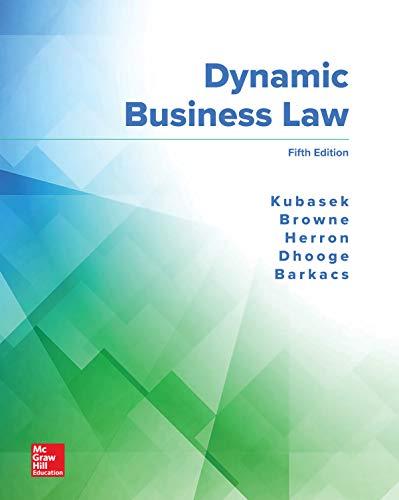In March 2006, Varosa Energy, LTD, contacted Jake Rollings, doing business as Jakes Equipment and Repair, about
Question:
In March 2006, Varosa Energy, LTD, contacted Jake Rollings, doing business as Jake’s Equipment and Repair, about purchasing a used drilling rig. Rollings knew of a used rig being sold by another company. Varosa and Rollings eventually agreed that Rollings would refurbish and sell the rig to Varosa for $1.3 million. Varosa also agreed to purchase two refurbished mud pumps for $484,000, to be paid in two installments. While Varosa and Rollings had no written contract reflecting the terms, Varosa paid $600,000 toward the oil rig and the first of the payments for the mud pumps.
Rollings simultaneously reached out to Tripplehorn, with whom Rollings had had previous business dealings. Tripplehorn agreed to invest in the oil rig, and they each paid half of the purchase price. Rollings and Tripplehorn orally agreed that the title would be held by Tripplehorn until he had received receipt of payment, upon which he would convey the title to the purchaser. Unknown to Tripplehorn, Rollings had already received $600,000 from Varosa for the rig.
In September 2006, Varosa and Rollings entered into a written agreement where Rollings acknowledged the previous payments and agreed to complete the refurbishment of the oil rig and the mud pumps in 60 days. The agreement also provided for three installations of $100,000 to be paid upon confirmation by a third-party inspector of certain milestones on the project. The contract made no mention of Tripplehorn.
The third-party inspector concluded that Rollings had not completed any of the work as set forth in the agreement and Varosa subsequently sued for breach of contract in September 2006. In October of the same year, Tripplehorn found out that Rollings had entered into a contract with Varosa and intervened in the lawsuit between Rollings and Varosa, filing cross-claims against Rollings.
Varosa amended its petition to include claims against Tripplehorn, alleging that Tripplehorn was jointly and severally liable. The trial court awarded Varosa $892,000 against Rollings but dismissed the motion against Tripplehorn. Varosa appealed.
Do you think that if Rollings and Tripplehorn were in a joint venture Tripplehorn should be held jointly and severally liable? Why or why not?
According to the appeals court, was the oral agreement between Rollings and Tripplehorn a joint venture? How did the court rule and why? Do you agree?
Step by Step Answer:

Dynamic Business Law
ISBN: 9781260247893
5th Edition
Authors: Nancy Kubasek, M. Neil Browne, Daniel Herron, Lucien Dhooge, Linda Barkacs





